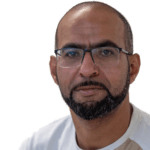Liberating the Spirit in Palestine
Ayman Nijim, Ph.D. candidate in Liberation Psychology and Transformative Social Change and Grassroots International’s Solidarity Program Officer for the Middle East, writes how Liberation Psychology can support the healing and liberation of Palestine. This is the first in a multi-part series on psychology and liberation from Ayman.
Human history is full of struggles between colonizers and the colonized. But since the 1970s, progressive psychologists and social justice activists have used liberation psychology to address the effects of oppression on our psyches. We know that the colonizer spares no effort to infantilize the soul of the colonized to continue their control over resources, to grab more land, and to stymie self-determination. Liberation psychology seeks to overcome this trauma and feelings of powerlessness to win a better world.
Meanwhile, Palestine is an important focus for many social justice activists and human rights defenders as it touches on multiple social justice struggles: land grabbing, water theft, ongoing wars, racism, and more. Even though liberation psychology centers the oppressed and the colonized, little has been done to explore how relevant it is to Palestine.
Liberation Psychology as a praxis
Social psychologist Ignacio Martín-Baró introduced Liberation Psychology during the 1970s to address the oppression and violence of authoritarian regimes in many Latin American countries at that time. Martín-Baró borrowed the term conscientization (critical consciousness) from the Brazilian teacher and intellectual, Paulo Freire. He then supplemented it with de-ideologization — breaking people away from dominant ideologies.
Conscientization allows individuals to develop a critical stance on their living world in a way that leads to more reflection and action. A de-ideologization process means reflecting on the structural roots of dominant ideologies and the actions needed to transform them for a more just world.
Martín-Baró challenged social psychologists to turn their efforts towards the poor and the disenfranchised by centering their experiences for social change. He attacked the way Eurocentric psychology focuses on the individual, and advocated instead for providing healing and support for the poor — not only the upper and middle class — in his own communities.
Moreover, Martín-Baró specifically called upon psychologists to focus on processes of de-ideologization in order to reduce the alienation oppressed peoples suffer as they’re shut out from knowledge and power. Martín-Baró did not advocate entirely to decolonize Eurocentric psychology. Instead he sought to adapt it in a culturally sensitive and contextually appropriate way — one focused on the poor and the oppressed. The legacy of Martín-Baró’s work continues globally today, including through the Martín-Baró Initiative at Grassroots International.
Liberatory cognitive praxis towards self-determination in Palestine.
The Gaza Strip has the highest population density in the world at 7,000 people per square mile. Gaza houses 2 million people bound within just 139 square miles. My family and other families can use just 4 hours of electricity a day, and the water is undrinkable. Around 75 percent of the population suffers from food insecurity.
Fisherfolks are attacked daily. Farmers are attacked every minute. All of this adds a strain on the economic, social, and political situation. In the last 15 years, Gaza experienced four major assaults. Israel does not allow Palestinians to operate an airport or a seaport in Gaza, with severe implications for Gazans’ ability to travel abroad or engage in foreign trade.
As we know from mainstream psychology, as soon as there is ongoing violence, complex or ongoing trauma pops up. Such ongoing trauma has extreme and potentially devastating effects on emotional health, especially when it lasts a long time. People who are exposed to danger repeatedly or for a long time may develop continuous traumatic stress disorder (CTSD) as a response.
Many in Palestine witness murders, imprisonment, shelling of homes, and hovering drones on a daily basis. And many have reacted to this trauma with cigarette consumption, poor dietary routines, and high levels of Tramadol overdose among young people. The World Health Organization has estimated that 20 percent of Gazans may have developed mental health conditions from Israel’s 2014 assault.
Healing and Making the Invisible Visible
Eurocentric or Western psychology bases healing on individualism, but in other cultures, the trauma healing intervention can often be quite different. We must take traditional and spiritual methods seriously when exploring the most sensitive and effective approach for healing. For instance, Mayan women have practiced Cosmovision as a healing method, bringing in land, fire, earth, and water as inseparable components for healing. Such culturally sensitive healing interventions can also effectively impact both the healer and the client.
Since collective trauma is prevalent among refugees and Indigenous people worldwide, including the Palestinian people, it is time to de-exceptionalize Palestine and decolonize the narratives that lead to the occupation of the mind. Centering the voices of Indigenous people in their own movements is an essential first step. For Palestinians to break away from the yoke of the oppression, international organizations, collectives, and networks need to center this Indigenous people’s narrative as a central voice in achieving decolonization. Collectively, we must make the invisible visible. Adopting the tenets of liberation psychology will help turn this struggle into a visible one.

